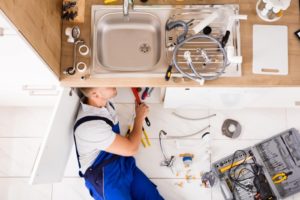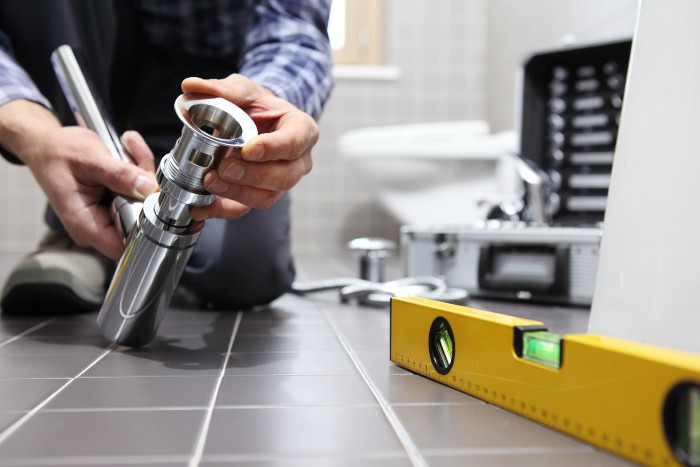
If you want to know how to become a plumber, all you need is a high school diploma or GED and then vocational training.
Plumbers work in both residential and commercial buildings to ensure that the plumbing in the building works properly and correctly.
Plumbers also do routine inspections and maintenance on buildings to ensure there are no issues with the plumbing.
If you learn to be a plumber, you will have a job for life. Not only can you get into a plumbers union, which will give you consistent work, but being a plumber is a recession-proof job.
People will always be doing construction and maintenance, so plumbers are always in high demand.
You might find yourself wondering, Is it hard to become a plumber? Becoming a plumber requires some dedication, but the rewarding career might be easier to obtain than you think.
The following detailed steps to becoming a plumber can help you get started down the career path!
Steps to Becoming a Plumber
If you want to become a plumber, follow the steps below.
1. Get Educated

The first step to becoming a plumber is getting an education in plumbing. To enroll in a vocational school, community college, or trade school, you will first need to obtain a GED or high school diploma.
The demand for trade occupations is rising, so many schools offer plumbing education programs. A quick Google search of where you live will likely yield multiple options for plumbing programs to enroll in.
During your plumbing education, you will learn about everything a plumber needs to know to do their job.
There will be several required courses as well as tests along the way to ensure that you are retaining information. Some of the information it will be critical for you to know about include:
- Plumbing systems and procedures,
- Pipefitting,
- Water heaters, and
- Tools and equipment.
Study.com has a thorough list of plumbing courses and a search tool to find plumbing programs in your area.
Although getting a plumbing degree is cheaper than going to a traditional college, it still costs money.
You can apply for scholarship funds or work with your institution to see what kind of financial aid they offer. You can find vocational educational programs through plumber’s unions who might even pay for your education.
2. Find a Plumbing Apprenticeship
Next, you will need to complete a plumbing apprenticeship. You cannot become a certified plumber without completing an apprenticeship.
After all, so much of a plumber’s job is hands-on work; you need to perform supervised work before attempting to complete jobs on your own. Don’t worry too much about finding an apprenticeship, though. Many vocational schools will help you find one.
To complete an apprenticeship, you will need to work for a required number of hours under the watch of a certified plumber.
Apprenticeship requirements will be different depending on the state in which you work. Make sure you know how many hours you need to complete to take the plumbing certification exam.
During your apprenticeship, you will get hands-on experience to help you master everything you need to learn to be a plumber. You will typically learn under a master plumber by helping them on the job.
This experience will solidify the things you learn in class and will show you what it is like every day working as a plumber.
You will also be able to ask the master plumber questions about the work and the profession, as well as observe how they interact with clients and handle finances and other administrative tasks.
3. Pass the Plumbing Certification Exam
Finally, you will need to pass the plumbing certification exam for your area. Note that each state has different exams.
Your vocational school and apprenticeship should teach you everything you need to know to pass the exam. In some areas, an exam is not necessary to become a certified plumber, so check local and state guidelines to be sure.
You should plan to study for the plumbing certification exam as you would for any other exam. Many publishers have practice exams available for purchase, so you can test your knowledge along the way.
4. Get Licensed
Every state has different requirements for licensing plumbers. Typically, to become a journeyman plumber, which is the name for a certified plumber, you need to pass a licensing exam after you have worked on the job for between two and five years.
After you become a journeyman plumber and work for a few years, you are then eligible to take the master plumber exam. As a master plumber, you can take on supervisory roles and design entire plumbing systems.
A Plumber’s Salary
It is important to understand the financial situation of both journeyman plumbers and master plumbers.
Luckily, trade occupations are always in demand. As a plumber, you are almost guaranteed to have a constant stream of work.
According to Glassdoor, a master plumber earns, on average in the U.S., $59,663 per year. A journeyman plumber earns slightly less than that, and a plumber apprentice earns less than a journeyman plumber.
Even though you won’t start out earning the highest amount you potentially could, it is important to note that even plumbing apprentices do make money.
You will get paid while still learning your career in plumbing, something that isn’t true in other professions.
Depending on where you live in the country, you might earn more or less than the Glassdoor average.
5. Advance your Career with Specialization
Once you have completed your education and passed the plumbing certification exams, you can further your career with more training and certification.
A few different plumbing specializations include:
- Irrigation and water drainage,
- Gas service technician,
- Pipefitters and steamfitters, and
- Commercial plumber.
These are just a few of many plumbing specializations you can obtain with additional training and certification.
You can consider if you want to work for a few years before going on to earn specializations. Becoming a plumber takes a few years, so getting some experience in the field before returning to training can be useful.
How Do I Get Started?
The fastest way to get started as a plumber is to contact a local plumbers union.
They will be able to point you toward the education and requirements you need to complete to become a plumber wherever you live.
Unions are a great resource for those trying to enter the field because unions are constantly looking to hire skilled labor.
Some unions may even pay for your schooling, so this is the first place to look if you want to learn to be a plumber.
Learning how to become a plumber may seem daunting at first, but once you enter the field, you will find countless people willing to help you succeed as a plumber. Follow the steps outlined in this article, and you are certain to become a plumber in no time.
Interested in a Career as a Plumber?
Stratford’s plumber training course is a great way to learn more about plumbing basics.
While this introductory course does not replace the need for a full plumbing program and on-the-job training, it is a good way to get acquainted with the profession.
Plus, with its thorough review of the various duties of a plumber, it can help you hone in on what your interests in plumbing are.
This comprehensive course covers all primary aspects of commercial and residential plumbing, including:
- History of plumbing and plumbing apprenticeships,
- Development of plumbing technology and plumbing codes,
- Plumbing safety and tools,
- Mathematics for plumbers,
- Print reading and sketching,
- Building and plumbing codes,
- Soldering, brazing, excavating, and welding,
- Water supply systems,
- The use of valves and meters,
- Designing and installing plumbing systems,
- Installing fixtures, faucets, and appliances,
- Residential and commercial plumbing projects.
Enroll in our plumbing learning course today!
Explore a Plumbing Career

Check out Stratford Career Institute’s online class to get started.

